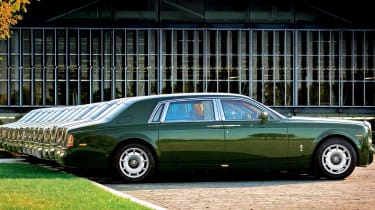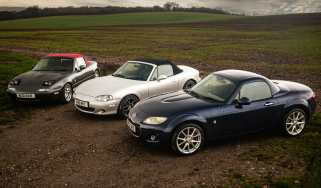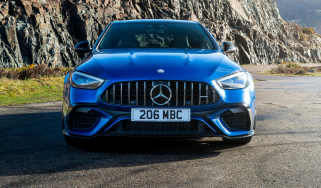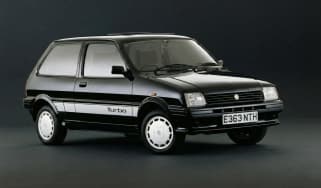Crisis? What crisis?
As bureaucrats swan around in limos, customers vote with their wallets

As scientists’ warnings about global warming and carbon dioxide emissions grow ever more apocalyptic, you might expect that those charged with formulating the policies and legislation to combat it would lead by example. All this year, unelected EU Commission bureaucrats have been thrashing out rules and regulations under which, they trumpet with deeply studied seriousness, they will force car makers to reduce their cars’ average CO2 emissions to 130 grammes per kilometre by 2012, and on down to 120 g/km a year or two later.
Never mind that it will cost the car industry, according to one respected body of research, nearly £8bn to meet the target – adding at least £1500 to every new car we buy. This is a crisis confronting us all, they insist with solemn, shaking heads.The industry, to its credit, has already made a fair bit of progress with very little prodding from Brussels and is making more at an increasingly rapid rate. Both petrol and diesel engines are already much more efficient than a decade ago. For sure, there are the conspicuous CO2-puffers – large SUVs like Porsche’s Cayenne and supercars like the Ferrari 599 – belting out 300 or more grammes per kilometre. But the industry average is already down to around 160g/km and even largish estate cars like Citroen’s diesel C5 are into the 190g/km mark.
So, who did the FT, by dint of some nifty research, find running a fleet of hundreds of cars with average emissions pushing the 250 g/km mark; far above the industry average? Yup, you guessed it – step forward those very same apparatchiks in Brussels. Well, you couldn’t really expect them to go slumming around in a fleet of Toyota Priuses, could you? Even if they do only emit 104 g/km, are relatively quiet and comfortable, will at a pinch seat five and are capable of carrying around an adequate supply of even the mountains of documents with which the men at the EU so notoriously like to surround themselves. Nope, it has to be a broad mix of BMWs, Mercedes, Audis, Volvos and similar; bad for the Brussels elite’s image, otherwise, mon ami.
At stake, however, is something more than having fun poking a stick into the EU nest. Given 2007’s car sales statistics from Europe and North America, regions where environmental awareness and concern are supposed to be high, it is becoming legitimate to ask whether consumers at large really care about the CO2 issue – or are simply paying lip service to it.
Let’s take SUV sales in the US: in the first 11 months of 2007, BMW X5 and X3 sales were up by almost 10 per cent, to more than 56,000, in a total new car market down around 3 per cent. Jeep sales were almost 20,000 higher, at 430,433, compared with the same period the year previously. M-class Mercedes sales were more than 5000 units higher at 64,978, Porsche Cayenne sales up almost 15 per cent and Land Rover sales nearly 3000 units higher at 44,663. The list is quite lengthy. Yes, there were sales slips, too – Hummer sales dropped sharply to 50,653 from 64,596 and Ford’s Explorer to 126,930 from 165,845. But sales of Ford’s even heftier Expedition were up by 10 per cent, to 82,761, and industry analysts say at least some of the dips were caused by ageing model line-ups. All this in a year during which Americans have been left semi-traumatised by surging petrol prices (still very cheap by world standards) and the SUV sector has received an unprecedented verbal duffing-up from the green lobby.
Something similar applies to high-performance and luxury cars. Ferrari sales in the US were higher, even if only by fewer than a 100 at 1452. Bentley and Lamborghini sales were up by close to 10 per cent, Maserati by more than 10 per cent. Jaguar XK sales just about held their own. However, total Porsche sales dropped by more than 1000 units, to 20,509, and Corvette and Z4 sales were also slightly weaker. Analysts say, however, that there is an explanation other than global warming for such downturns; one much more closely related to the global credit crunch and job fears among the Wall Street and financial services brigade who form the core of the supercar makers’ customers.
The picture is not dissimilar in Europe. Porsche in 2007 enjoyed record sales and earnings. Bentley sales passed through the 10,000 threshold for the first time. Aston Martin, which once struggled to make a few dozen cars a year, should be following Bentley across the 10,000 threshold within the next three years. Even Maserati is enjoying ballooning sales at the moment with 2007 proving to be the best year ever under Fiat leadership at 7500 units; 2008 sales are expected to reach 10,000 units and there’s even talk of introducing two shifts to keep waiting lists down. As for the much-maligned SUV market, Land Rover sold a record 192,500 SUVs in 2007, with its best-ever sales month in September. As MD Phil Popham puts it, ‘Land Rover’s on a roll.’
Lower down the marketplace, dealers have not exactly found themselves inundated with orders for stripped-down Golfs et al, bereft of creature comforts like air con and mega-sound systems (for each 10 per cent of weight reduction in a car, there is roughly a 7 per cent reduction in emissions of CO2). For sure, VW’s ultra-frugal Polo Bluemotion is doing well – output has recently had to be increased at the Pamplona plant where it is built – and Mazda is pleased with the reception of its new Mazda 2, some 100 kilogrammes lighter than the old.
But it doesn’t look like much of a stampede to save the planet, does it? Just like the eco-warrior sneakily happy to take a BBC-funded taxi to the studio to slag off the car makers, the CO2 issue, to a greater or lesser extent, makes hypocrites of us all.


